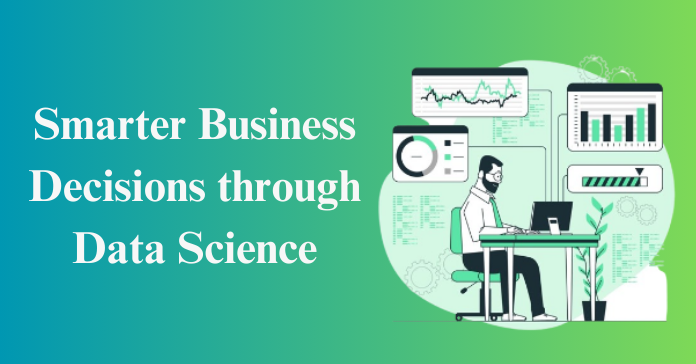Smarter Business Decisions through Data Science
In today’s data-driven world, businesses are inundated with information. However, raw data alone holds limited value. Extracting meaningful insights and transforming them into actionable strategies is crucial for making informed decisions and gaining a competitive edge. This is where data science services come into play, offering a powerful solution to unlock the hidden potential within your data and drive smarter business decisions.
From predicting customer behavior and optimizing marketing campaigns to streamlining operations and mitigating risks, data science empowers businesses to make data-driven decisions across various domains. However, many organizations struggle to effectively leverage their data due to a lack of expertise, resources, or appropriate tools. This can lead to missed opportunities, inefficient processes, and a failure to capitalize on the valuable insights hidden within their data. In this article, we’ll explore how data science services can help businesses overcome these challenges and transform their data into a strategic asset.
What’s the Difference Between Data Science and Data Science as a Service?
Data science involves extracting meaningful insights from data to drive informed decision-making and achieve business objectives. It encompasses a range of techniques, including statistical analysis, machine learning, data mining, and predictive modeling, to uncover patterns, trends, and relationships within data. For businesses, data science can be instrumental in understanding customer behavior, optimizing operations, identifying new opportunities, and mitigating risks.
Data Science as a Service (DSaaS) provides businesses with access to data science expertise and tools without the need for significant upfront investments in infrastructure or hiring specialized personnel. DSaaS providers offer a range of services, including data analysis, model development, and ongoing support, allowing businesses to leverage data science capabilities on a flexible and scalable basis. This approach enables organizations to access advanced analytics and derive valuable insights from their data without the challenges of building and maintaining an in-house data science team.
So what is Data Science as a Service in comparison with data science? While data science is a broad field encompassing various techniques and applications, DSaaS focuses specifically on delivering data science capabilities as a service. The key difference lies in the delivery model. Data science may involve building an internal team and infrastructure, while DSaaS provides access to these capabilities through a third-party provider. This distinction allows businesses to leverage data science expertise and tools without the complexities of managing an in-house team, enabling them to focus on their core business objectives while benefiting from data-driven insights.
Advantages of Data Science as a Service
-
Cost-effectiveness
DSaaS eliminates the need for significant upfront investments in infrastructure and personnel, making it a financially attractive option for businesses of all sizes. By leveraging a pay-as-you-go model, organizations can access advanced analytics without the burden of ongoing maintenance and support costs.
-
Scalability and Flexibility
DSaaS solutions can easily scale to accommodate growing data volumes and evolving business needs. This flexibility allows businesses to adapt their data science capabilities as required, ensuring they have the resources they need to extract valuable insights from their data.
-
Access to Expertise
DSaaS providers offer access to a pool of experienced data scientists, analysts, and engineers with specialized expertise in various domains. This allows businesses to leverage advanced skills and knowledge without the challenges of recruiting and retaining in-house talent.
-
Faster Time-to-insight
DSaaS solutions can accelerate the process of extracting insights from data by providing pre-built models, tools, and workflows. This enables businesses to quickly derive value from their data and make informed decisions without lengthy development cycles.
-
Focus on Core Business Objectives
By outsourcing data science tasks to a DSaaS provider, businesses can free up internal resources and focus on their core competencies. This allows organizations to streamline operations, improve efficiency, and dedicate more time to strategic initiatives.
Challenges of Data Science as a Service
-
Data Security and Privacy
Entrusting sensitive data to a third-party provider requires careful consideration of data security and privacy measures. Businesses must ensure that the DSaaS provider complies with relevant regulations and implements robust security protocols to protect their data.
-
Vendor Lock-in
Choosing a DSaaS provider can lead to vendor lock-in, making it challenging to switch providers or bring data science operations in-house later. Organizations should carefully evaluate contract terms and data migration options before committing to a DSaaS provider.
-
Integration with Existing Systems
Integrating DSaaS solutions with existing IT infrastructure and data sources can be complex, requiring careful planning and technical expertise. Businesses need to ensure seamless data flow and compatibility between their systems and the DSaaS platform.
-
Customization and Flexibility
While DSaaS providers offer a range of pre-built models and tools, customization options may be limited compared to developing in-house solutions. Businesses with unique or highly specific needs may require greater flexibility than some DSaaS offerings provide.
-
Communication and Collaboration
Effective communication and collaboration are essential for successful DSaaS implementation. Businesses need to establish clear expectations, maintain open communication channels, and ensure alignment between their internal teams and the DSaaS provider.
Main Tools for Data Science Solutions
Data science solutions leverage a variety of powerful methods to extract insights and drive innovation. Machine learning algorithms enable predictive modeling and automation of complex tasks, while artificial intelligence provides the foundation for intelligent systems and decision-making. Deep learning delves into intricate patterns within data, uncovering hidden relationships and driving advancements in areas like image and speech recognition. Data mining techniques extract valuable knowledge from large datasets, revealing trends and anomalies that inform strategic decisions. Computer vision enables systems to see and interpret visual information, opening doors to applications like object recognition and image analysis. Predictive analytics utilizes historical data to forecast future outcomes, empowering businesses to make proactive and informed decisions.
Below you can explore the specific technologies and tools that empower data science solutions and drive innovation across industries:
-
Cloud Platforms
Cloud platforms like AWS, Azure, and Google Cloud provide a comprehensive suite of tools and services for data science, including data storage, processing, machine learning, and visualization. Their scalability and flexibility make them ideal for handling large datasets and complex analytical tasks.
-
Programming Languages
Python is an essential programming language for data science, offering extensive libraries and frameworks for data analysis, statistical modeling, and machine learning. Their versatility and ease of use make them popular choices for both novice and experienced data scientists.
-
Data Visualization Tools
Tools like Tableau and Power BI enable data scientists to create interactive and insightful visualizations that communicate complex data patterns effectively. These visualizations aid in data exploration, analysis, and presentation of findings to stakeholders.
-
Machine Learning Frameworks
Frameworks like TensorFlow and PyTorch provide the building blocks for developing and deploying machine learning models. They offer a range of algorithms, tools, and functionalities to streamline the model development process and enable advanced analytics.
-
Big Data Technologies
Technologies like Hadoop and Spark are essential for processing and analyzing massive datasets that exceed the capacity of traditional data processing tools. These technologies enable distributed computing and efficient handling of large-scale data operations.
Data Science and Smart Business Decision-making: Real-life Examples
Data science has emerged as a transformative force across various industries, empowering businesses to extract valuable insights from their data and make informed decisions. Its applications are vast and diverse, ranging from customer behavior analysis and fraud detection to operational optimization and risk management. Below, we explore some compelling examples of how businesses leverage data science to gain a competitive edge and drive innovation.
-
Personalized Customer Experiences in Retail
Retailers like Amazon and Walmart use data science to analyze customer behavior, browsing history and purchasing patterns, enabling them to make tailored product recommendations. By leveraging machine learning models, these companies predict customers’ preferences and promote products that are likely to appeal to each individual. This personalized approach not only increases customer satisfaction but also drives higher conversion rates and sales.
-
Predictive Maintenance in Manufacturing
Manufacturers like General Electric and Siemens utilize data science to monitor machine performance and predict when equipment will need maintenance. By analyzing sensor data and historical maintenance records, they can forecast potential breakdowns and plan timely repairs, preventing costly downtimes. This predictive maintenance approach minimizes production interruptions, enhances safety, and ultimately saves millions in operational costs.
-
Enhanced Fraud Detection in Financial Services
Financial institutions, including JPMorgan Chase and PayPal, implement data science to identify fraudulent transactions in real time. By using machine learning algorithms trained on vast amounts of transaction data, these systems can quickly flag unusual patterns or anomalies that may indicate fraud. This proactive fraud detection helps reduce financial losses, increase security, and build customer trust in their services.
-
Optimized Inventory Management in E-commerce
Companies like Alibaba and Target utilize data science to forecast demand, track inventory turnover, and manage stock levels efficiently. By analyzing purchasing trends, seasonal demand, and supply chain data, they can optimize their inventory to meet customer demand without overstocking or understocking. This approach reduces holding costs, minimizes waste, and ensures that popular items remain available for customers.
-
Improved Patient Outcomes in Healthcare
Healthcare providers, including organizations like Mayo Clinic and Cleveland Clinic, use data science to analyze patient data, predict disease progression, and tailor treatment plans. Through machine learning algorithms that analyze medical history and treatment outcomes, doctors can make more accurate diagnoses and recommend personalized care. This data-driven approach leads to improved patient outcomes, reduced hospital readmissions, and a more effective use of healthcare resources.
Conclusion
Data Science as a Service enables businesses to drive measurable revenue growth by uncovering insights that directly inform smarter decisions and targeted strategies. With access to advanced analytics and predictive modeling, companies can optimize marketing efforts, reduce operational costs, and enhance customer retention, all of which translate to stronger financial performance. By using data science services, businesses leverage expert knowledge and powerful tools to transform data into a consistent source of competitive advantage and improved ROI.




